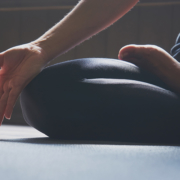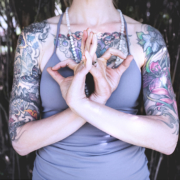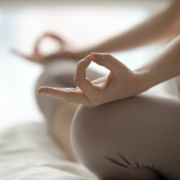My Metta Sadhana: Working With Lovingkindness To Undo Fear
All of my life I have know fear and anxiety, they have been my constant companions. I know that my experience is by no means uncommon, despite the fact that we may not speak about it. As a yoga teacher for many years I have come to see that I am not alone in living my life with an underlying script of fear, this has helped me to find more compassion for myself, and for others who I also know to be suffering. I have also been very fortunate to have found numerous tools and healing practices along my journey, practices that have helped me to recognize the way that fear affects my life, and practices that have helped me to move through fear to find a sense of true safety and ease. One of the most transformative practices in this regard has been a regular practice of meditation, and in particular the practice of Metta or Lovingkindness. In this article I will share some of my personal experience with meditation, and how I have worked with the Metta practice in my own life.
Learning Meditation
My first experience of meditation occurred when I was about 7 or 8 years old, when I was fortunate enough to have an inspired elementary school teacher who taught us Tai Chi during our physical education class. I remember her leading us through a simple form of the practice followed by a short session of conscious relaxation which she called “The Sponge”, and which I later recognized as a form of Savasana. I can still remember lying on the cold gymnasium floor and practicing melting into the ground until I was completely soft and relaxed. What she was teaching me was how to create an experience of peacefulness and ease, a feeling of safety in my own body, and it was amazing. Though I did not consciously begin to practice this on my own I believe it left an imprint on me so that when I later came to the practice of yoga as a fragmented and despairing 24 year old it felt like I was coming home. My everyday experience at that point in my life was characterized by great fear and anxiety I immediately recognized the yoga practice as something that could help me to re-discover the feeling of ease that my grade school teacher had helped me to access.
I began practicing meditation in the year 2000, and my first introduction to the practice was through a form of Zen Meditation. It was offered as part of my first Yoga Teacher Training, and I also explored it at the Vancouver Zen Centre. What I learned from my time of study here was how to become aware of my present moment experience and the content of my mind. To be honest this was very difficult for me as up until this time I knew that I been suffering, my life was full of the drama and pain that were proof of that, but I was not aware of how much my inner dialogue was contributing to my experience of suffering. As I began to learn how to shine the light of awareness onto my own mind I was frankly horrified by what I saw, a constant running dialogue of fear and self hatred that seemed to be running 24 hours a day, non stop. My teachers assured me that awareness was the first step in creating change and to simply practice staying present with what I was witnessing, and I trusted them so I stuck with it. I continued with basic mindfulness practices until I was able to create an experience of compassionate awareness even whilst terrible thoughts and difficult emotions moved through me. This experience of compassionate awareness was another way that I began to cultivate a relationship with a sense of peacefulness & ease that was not dependant on specific external (or internal!) conditions.
Over the years of my yoga and meditation studies I have explored many different approaches to practice, all of which have given me new tools to weave into my personal sadhana, but at the foundation of all of them lies this basic mindfulness along with an intention to cultivate a felt experience of well being. I have learned how to access this felt experience of well being by means of a mantra (the repetition of an auspicious sound that represents a blessing force), through learning how to identify and release tension in my body, by learning how to regulate my nervous response using my breath, and by working with phrases of affirmation, but one of the most powerful practices I have worked with in recent years has been the practice of Metta or Lovingkindness practice.
What Is Metta?
Metta is a Pali word which means friendliness, gentleness, benevolence, or love, it is generally translated to mean loving kindness. The Metta practices were taught by the Buddha over 2500 years ago, and they are still powerfully relevant today, maybe even more so. The way in which I have been taught Lovingkindness practice is to work with a series of phrases that represent a sincere desire to cultivate the good in our own lives, and to offer that same blessing to others. One of my favourite teachers, Jack Kornfield, recommends repeating the phrases to yourself while holding in your heart a vision of yourself as a young child. I think this is a lovely practice which speaks to the quality of well wishing we bring to this practice and which can help us to bypass some of the shame or self criticism we may feel for ourselves as adults. For myself I do not work so much with visualization while doing the practice, rather I focus on the words themselves, their energetic qualities, the weight and the power of them as I drop them into the space of my heart and mind. This works well for me as I am very familiar with mantra practice and Lovingkindness in my mind is a form of mantra practice, but rather than using a Sanskrit mantra I am using English phrases.
So what are the Metta phrases? Well the traditional phrases are generally something like-
May I be free from danger
May I be free from mental suffering
May I be free from physical suffering
May I have ease of well-being
You may notice that these are phrases we repeat for our own well being, and that is because this is considered the starting point of Metta practice. It is thought that only when we can cultivate an experience of lovingkindness and compassion for our ourselves are we capable of truly extending it outwards, and I have felt this to be so. As my own feelings of positive self regard and care deepen I am able to access more care and regard for others. Empathy is not easy to access when we are caught in the grips of fear, but do understand that fear cannot take control where love exists. And because love is not bound by feelings of affection the cycle of Metta practice then flows into extending these well wishes towards our friends & mentors, then towards people we might see regularly but have a neutral quality of affection for (like community members). Only then do we turn in the direction of what is traditionally known as “the enemy” or those we are challenged by, which is by means an easy practice, and finally towards all beings everywhere. And of course this is not a linear journey, rather it is one that we spiral through again and again, a practice that slowly releases us from fear and self criticism and allows us to experience true compassion and kind regard for others – even when they are very different than us.
My Personal Metta Sadhana
I have been working with the Metta practices in a more dedicated way for over a year now, and am currently in the midst of a 30 day Metta Sadhana that I created for myself, which means I am doing 30 minutes of Metta practice each day from one New Moon to the next. I made a commitment to this because I found that this practice was bearing fruit in my life and I wanted to see what I could shift if I focused on it more directly. What do I mean when I say the practice has been bearing fruit? What I mean is that over the last year of working with Lovingkindness practice on a more regular basis I have noticed an increased experience of peacefulness and ease, a reduction in cynicism and self judgement, and a greater potency in my personal practices of prayer- especially in regards to my prayers for others. All of this has helped me to feel less overall fear and anxiety, or at least a greater ability to recognize fear and anxiety when they are present, and to then choose a conscious cultivation of safety and ease in response. These benefits are something that I believe to be of great value to everyone and represent some of the primary benefits that mindfulness practices such as meditation & yoga can offer us, they are also benefits which I think the Metta practices can deepen and expand.
The Metta phrases I am currently working with are a combination of phrases I have learned from my teachers, and words that have personal meaning to me. In them I avoid words such as danger or suffering, and instead focus on their opposite as they feel better when repeated. My current phrases are-
May I be peaceful and at ease,
May I know safety.
May I be filled with gratitude,
May I be happy.
May I be peaceful and at ease….
When I say this I immediately feel greater ease, I am reminded of my intention to move through life peacefully and without force.
May I know safety….This phrase is very powerful on a personal level as I have felt unsafe for most of my life, so when I say it I am asking not only to be blessed with physical safety but also that I may know and remember that I am safe in my own body and in my own heart, even if it is just in this moment.
May I be filled with gratitude……This phrase came to me recently and it felt like truth as the experience of gratitude has been one of the most transformative emotions I have felt in my life, when I am filled with gratitude I have a soft and open heart, there is no room for fear or anxiety, there is no lack- I can live on gratitude!
May I be happy…I have struggled with this phrase at times as happiness seemed like such a shallow thing to desire, or maybe the word itself just didn’t seem right- what is happiness anyway?- but once I preceded it with the wish for gratitude then happiness made sense. Actually I feel that the first three phrases are what allow for the experience of the fourth, in other words when I feel safety, peacefulness and gratitude, when I am free from struggle or striving the result is happiness. I also think that happiness is a choice, a way of responding that is rooted in contentment with what is, not a denial of suffering. So when I say this phrase I often but the stress on “May I be happy”, which reminds me that I can choose happiness in each moment.
Metta: Intention, Prayer, & Blessing
Working with the Metta practice feels like a bringing together of a number of different practices that have all been valuable to me. Specifically the practices of intention setting, meditation, mantra (internal silent repetition), prayer, and the offering of blessings. When I sit down to do my meditation I repeat the phrases aloud and it sets the tone for my practice, it reminds me of my desire and intention for practice. When I use the Metta phrases as a concentration technique in meditation it gives my wandering mind something to come back to, and when I repeat the words slowly, and with feeling, I am infused with their qualities in much the same way as I have used Sanksrit mantras for years. Metta feels like a practice of prayer, and when I offer it to others- my family members and friends, those who are suffering, and all the beings I share this planet with- it holds great blessing force and swells my heart in response. In many ways I am a beginner to this practice as I have only been working with it regularly for a year, but it is one that has offered me great benefits and one that I know I will continue to use for years to come.
May you be peaceful and at ease,
May you know safety.
May you be filled with gratitude,
May you be happy.














